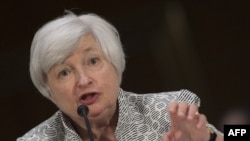No one knows when the U.S. Federal Reserve will begin again to raise the key interest rate that banks pay on overnight loans, but the central bank's July meeting minutes suggest it could be soon.
Since 2008, the Fed's key interest rate has been near zero.
On Wednesday, the Fed released the minutes from last month's meeting, and they show a majority of Fed policymakers believe interest rates can rise because the U.S. economy is now strong enough. But when interest rates will start to go up is the big unknown.
Wall Street hopes to learn more from Fed Chair Janet Yellen, who is scheduled to speak Friday at an economic conference in Wyoming.
Although Fed governors appears to say interest rates should rise, some conservative economists, including John Makin at the American Enterprise Institute, a Washington-based research institute, argue that the Fed should keep interest rates low for a while longer.
Makin said the 4 percent growth rate observed in the U.S. economy during the second quarter of this year could be short lived, and will be especially brief if the Fed is encouraged to raise rates. He pointed out that economic growth in the U.S. was less than 0.95 percent during the first quarter, below the 3 percent forecast by the Fed.
According to Makin, “without more artificial stimulus from the Fed... stock prices may - appropriately - begin to fall." He said low interest rates have created a market bubble on Wall Street.
Minutes from the July Fed meeting and the Bank of International Settlements annual report released in June suggest the low interest rates are failing to address some of the economic problems besetting the U.S.
Several of the participants at the Fed meeting, according to the minutes, expressed concern that Americans are saving too much, and "that the slow rise in wages and income might be insufficient to support stronger consumer spending." The factors suggest the Fed's six years of easy money policy may not be the prescription needed.
The meeting participants also said "a recovery in housing activity remains slow." They noted that "although mortgage rates were still low and housing appeared to be relatively affordable, various factors were seen as restraining demand, including low expected income and high levels of student debt as well as difficulty in obtaining mortgage credit, particularly for younger, first-time homebuyers."
Nevertheless, Makin argues for a continued easy money policy, at least until inflation moves above 2 percent.
According to last month's meeting minutes, that may be what the central bankers have in mind. The participants at the July meeting “noted that inflation had moved somewhat closer to the Committee's 2 percent longer run objective, and generally saw the risks of inflation running persistently below their objective as having diminished somewhat." At the same time, they were discussing at some future point allowing interest rates to rise.
Makin's other concern is that “an abrupt Fed move toward more tightening risks" could depress financial markets, which in the U.S. are near record highs.




